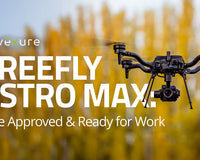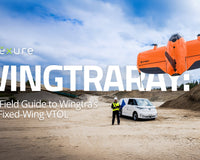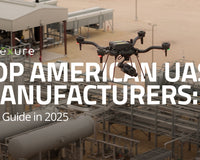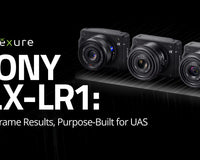Drone Deer Recovery: A Viable Solution?
(Updated as of June 11, 2024)
As hunting season gets underway, a growing number of hunters are considering drones equipped with thermal sensors as a potential solution for locating and recovering deer. You may be asking, "Is using drones for deer recovery legal?"
The answer, like many aspects of drone usage, is complex and nuanced. As of October 31, 2023, 45 out of the 50 U.S. states have laws that restrict the use of drones in hunting. While the Federal Aviation Administration (FAA) governs U.S. airspace, individual states have their regulations on how drones can be used for hunting. We'll delve deeper into this later.
With that said, laws are constantly changing. For a full list of states and their individual regulations, we recommend checking ereulations.com before you start your next hunt or make any investments.
This article will explore where drones are permitted for deer recovery, discuss the ethical considerations surrounding the use of unmanned aerial vehicles (UAVs) in hunting, provide Advexure's recommended deer recovery "kit," and help you determine whether it’s worth the investment.
With that said, laws are constantly changing. For a full list of states and their individual regulations, we recommend checking eregulations.com before you start your next hunt or make any investments.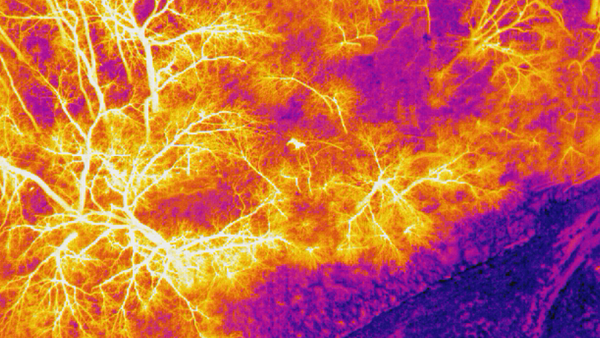
Thermal drone capture of a downed buck in the Midwest.
The Ethics of Fair Chase
If you're wondering why so many states ban drone use even for recovering downed game, the answer lies in the principle of Fair Chase
Most hunters are very familiar with the principle of Fair Chase, but for those who aren't, here is the modern interpretation as defined by The Pope and Young Club, a US-based organization that promotes bowhunting:
The term “Fair Chase” shall not include the taking of animals under the following conditions:
- Helpless in a trap, deep snow or water, or on ice.
- From any power vehicle or power boat.
- By “jacklighting” or shining at night.
- By the use of any tranquilizers or poisons.
- While inside escape-proof fenced enclosures.
- By the use of any power vehicle or power boats for herding or driving animals, including use of aircraft to land alongside or to communicate with or direct a hunter on the ground.
This honor code widely adopted by North American hunters since the early 1900’s is likely the reason many states restrict drone usage in hunting, as the argument can be made that it provides an unfair advantage over the game and diminishes the need to master traditional hunting skills like spotting and tracking.
The concept of drone recovery, however, is a bit of a moral gray area for some hunters, who believe it doesn’t diminish the hunt and can help to spare animals needless suffering by allowing hunters to locate them faster.
Interestingly, the International Game Fish Association has allowed anglers using drones like the DJI Phantom to bait schools of fish. It begs the question, why is drone use acceptable in fishing but not in hunting?
Regardless of where you stand on the issue, It’s imperative to know your state laws and abide by the rules and regulations set by both the governing bodies for wildlife & game, as well as the FAA.
<State Restrictions on Drone Use in HuntingBefore we get into the logistics of deer recovery, let's look at some examples of restrictions on drone use in specific states as it relates to hunting.
North Dakota
In North Dakota, it is illegal to use all types of aircraft, manned or unmanned, for spotting game 72 hours prior to and during the hunting season.
Alaska
Alaska prohibits the use of drones during hunting. However, you are allowed to use a drone for photography generally the day before you begin your hunt.
Alabama
Alabama also bans the use of drones for hunting but permits its usage for scouting the land.
Kansas
In Kansas, you can use a drone for scouting on privately owned land but not on lands managed by the Kansas Department of Wildlife Parks & Tourism.
Tennessee
The state completely prohibits the use of UAVs for hunting wildlife.
Texas
In Texas, using drones for hunting is a Class A misdemeanor, although special permits can be obtained for hunting predatory or nuisance species like wild boars.
Wisconsin
Wisconsin has a zero-tolerance policy for using drones for any aspect of hunting.
Wyoming
The state of Wyoming restricts the use of aircraft for scouting or taking game animals during their hunting season from August 1 to January 31.
Utah
In Utah, drones are not allowed less than 48 hours before you plan to hunt and not until 48 hours after the hunting season has closed.
If Not Here, Then Where?
So this begs the question, where CAN you use drones for deer recovery? It appears the only states that don’t have specific laws expressly prohibiting drones for recovery are Kentucky, Maryland, Delaware (not in State Wildlife Areas), Oklahoma, and South Carolina (except game birds) as of 10/31/2023.
With that said, laws are constantly changing. For a full list of states and their individual regulations, we recommend checking ereulations.com before you start your next hunt or make any investments.
US State |
Is it legal to use a Drone for Hunting? |
|
Alabama |
No |
|
Alaska |
No |
|
Arizona |
No |
|
Arkansas |
No |
|
California |
No |
|
Colorado |
No |
|
Connecticut |
No information available in state’s registry |
|
Delaware |
Yes, but not on State Wildlife Areas |
|
Florida |
No |
|
Georgia |
No |
|
Hawaii |
No, if a drone is classed as aircraft |
|
Idaho |
No |
|
Illinois |
No |
|
Indiana |
No |
|
Iowa |
No, if a drone is classed as aircraft |
|
Kansas |
Yes and no. Drones may not be used for hunting, locating wounded or harvested game, or taking fish. A drone can be used to scout on land not owned or managed by KDWPT. However, hunting is not allowed on the same day aerial scouting occurs. |
|
Kentucky |
No information available in state’s registry |
|
Louisiana |
Yes, but not in State Wildlife Areas |
|
Maine |
No |
|
Maryland |
No information available in state’s registry |
|
Massachusetts |
No, if a drone is classed as aircraft |
|
Michigan |
No |
|
Minnesota |
Yes, but not in State Wildlife Areas |
|
Mississippi |
No |
|
Missouri |
No |
|
Montana |
No |
|
Nebraska |
No |
|
Nevada |
No |
|
New Hampshire |
No |
|
New Jersey |
No |
|
New Mexico |
No |
|
New York |
No |
|
North Carolina |
No |
|
North Dakota |
No |
|
Ohio |
No |
|
Oklahoma |
No information available in state’s registry |
|
Oregon |
No |
|
Pennsylvania |
No (current legislation being proposed to allow for deer recovery) |
|
Rhode Island |
Yes |
|
South Carolina |
Yes, but not for game birds |
|
South Dakota |
No |
|
Tennessee |
No |
|
Texas |
No, but permits can be granted for predatory or nuisance species such as wild hogs. |
|
Utah |
No |
|
Vermont |
No |
|
Virginia |
No |
|
Washington |
No |
|
West Virginia |
No |
|
Wisconsin |
No |
|
Wyoming |
No |
Changes and Updates for 2024
Pennsylvania
Legislation is currently being proposed to legalize the use of thermal drones for deer recovery in Pennsylvania. This follows recent legal cases where individuals were penalized for using drones to recover downed game, highlighting a push towards updating state laws to accommodate new technologies
Michigan
The Michigan Department of Natural Resources (DNR) has reinforced that using drones to locate dead deer is illegal, classifying it as an unlawful "take" of game. This has led to ongoing legal challenges questioning the fairness and application of this regulation (MeatEater, 2024).
Wisconsin
New guidelines released by the Wisconsin DNR emphasize the distinction between federal FAA regulations and state-level concerns. Drone use is allowed for wildlife conservation and herd analysis but remains restricted for deer recovery to prevent unethical hunting practices
States Where Drones Are Permitted for Deer Recovery (as of June 2024)
- Kentucky: No specific regulations prohibiting drone use for recovery.
-
Maryland: No explicit restrictions.
-
Delaware: Allowed, but not on State Wildlife Areas.
-
Oklahoma: No specific regulations prohibiting drone use for recovery.
- South Carolina: Permitted, except for game birds.
Deer Recovery Recommendations
If you happen to live in one of the five states that currently allow drones for deer recovery, we have some recommendations for equipment, a breakdown of the costs involved, and some considerations on whether to hire a drone recovery service or to do it yourself:
Drone Deer Recovery (DDR) and other Professional Services
Drone Deer Recovery (DDR) has emerged as a distinct service offering in the past few years, with professionals using drones to locate and retrieve hunted deer. Sophisticated drones equipped with thermal imaging cameras and advanced GPS technologies have made it much easier to locate downed game in challenging terrains.
Hiring a Professional Pilot
The first step when hiring a professional like DDR is a consultation to plan the mission. They will ask for details like the general location, the time since the hunt, and any landmarks. This consultation is usually free, but it's essential for mission planning.
A professional service could charge anywhere between $250 to $500 per recovery. The pricing usually incorporates the pilot's fee, drone operating costs, and possibly a success fee. Some services may charge additional fees for covering large areas.
The Value Prop for Professional Services
While hiring a professional pilot may seem costly, it offers some advantages. These experts bring experience in drone piloting, advanced thermal imaging interpretation, and navigational expertise. Their services significantly increase the chances of locating the deer quickly and efficiently.
Doing It Yourself: The Logistics
Equipment Recommendations for Deer Recovery
Here's a list of equipment we recommend:
- DJI Matrice 30T (thermal): A drone equipped with thermal imaging, perfect for locating deer. $9637
- DJI TB30 Batteries for M30T Aircraft: To extend your drone's operational time. $330 each
- DJI WB37 Batteries for the DJI RC Plus Controller:: Backup batteries for your drone's controller. $60 each
- CZI LP12 Searchlight and Broadcasting System for DJI M30 Drone: Useful for nighttime operations. $2000
- DJI RC Plus Strap Kit: Provides better ergonomic support while handling the remote controller. $40
- Advexure Hoodman Landing Pad: For secure and precise takeoffs and landings. $70
Know Your Equipment, Learn to Fly, and Get Your Part 107
When taking the DIY approach, it’s important to understand that purchasing a UAV or drone is not as straightforward as opening the box and flying. It’s critical to learn how to fly a drone.
Get some practice time on the sticks and learn how to make evasive maneuvers (if necessary) to keep your drone and others safe. If you’re flying any drone over 249g or for commercial purposes, you will also need to obtain a Part 107 pilot’s license, as outlined by the FAA.
Once you understand the basics of drone flight and operation, we highly recommend looking into how to read and use thermal to its full potential properly. Thermography courses are available to help pilots learn this valuable skill.
Steps for DIY Drone Deer Recovery
So you’ve invested in a drone and some accessories, learned to fly, and you’ve downed a buck, what next? Let’s talk about the logistics of locating your kill with a drone.
- Preparation: Make sure all your equipment, especially the drone and batteries, are charged and in optimal condition.
- Initial Scouting: Deploy the drone to assess the area.
- Thermal Scanning: Use thermal imagery to spot the deer.
- Marking the Location: Once you've located the deer, mark the location using GPS.
- Retrieval: Navigate to the marked location for retrieval.
- Return and Landing: Safely return and land the drone on the landing pad.
Know the Laws, Fly Safe
Whether you are contemplating starting a business in drone deer recovery or purchasing equipment for personal use, it is crucial to consult your local state laws before making any significant investment. This can’t be overstated.
Advexure, like many other commercial/enterprise UAS dealers, does not accept returns for commercial/enterprise platforms and is not responsible for any legal consequences as a result of misuse of drones or UAVs by our end-users. We want to empower all of our readers and customers alike to do your research.
Always understand where and when you can fly safely and legally. Happy hunting!



